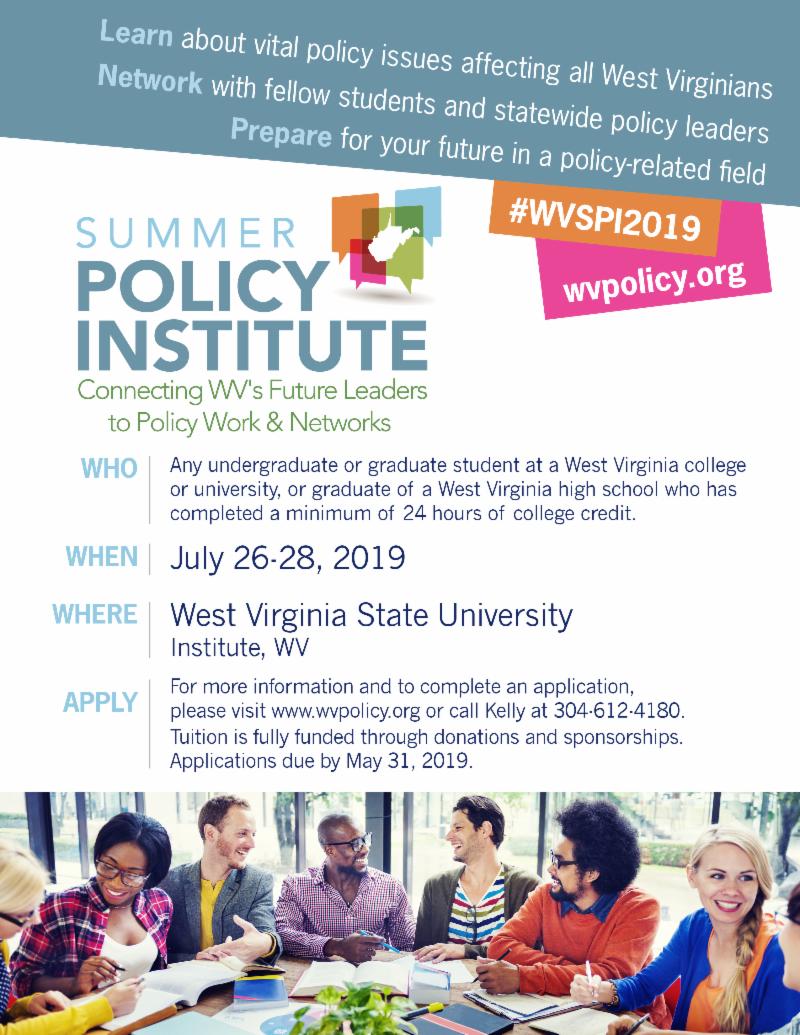With a special session targeting education reform expected in the near future, controversial policies like charter schools and Education Savings Accounts (ESA) are likely to be part of the legislative agenda. A deeper dive into Scholarship Tax Credits, a possible substitute for ESAs, shows that they are likely to benefit wealthy people more than low- and middle-income families. Based on data on Virginia’s program, less than one percent of the tax credit is claimed by families earning less than $50,000 and nearly 43% ends up in the pockets of those earning more than $1,000,000 a year.
Education reform should focus on policies with proven track records of success that benefit all of West Virginia’s students, not convoluted proposals to move public funds into the private school system, while leaving out all but a few students who are able to take advantage.
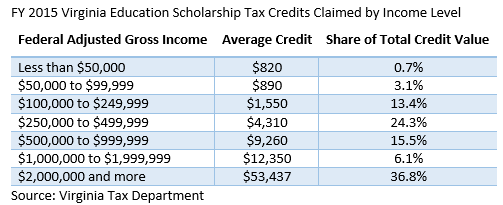
Read more in Sean’s blog post.
Created as part of the 2017 federal tax law, “Opportunity Zones” (OZs) are designated distressed areas in states that provide federal tax breaks for (mostly) wealthy investors without any real protections for local residents or any guarantee to improve the well-being of those that live in these areas. Since West Virginia did not “decouple” from these federal tax provisions, it will automatically see a reduction in state income taxes from investments in OZs.
Even worse, West Virginia seems poised to double down on this tax policy by offering its own tax breaks for investments in OZs during the upcoming legislative special session despite a large body of research that shows that they are largely ineffective at creating jobs or reducing poverty.
Read more on the potential impact of this policy on the Rockwool project in the state’s Eastern Panhandle which could be in line for a big federal tax break.
Matthew Massie is joining our team as our Summer Research Associate. A native of South Charleston, West Virginia, he holds a B.A. in History from Yale University and is currently pursuing a J.D. from the West Virginia University College of Law. Matthew is interested primarily in labor and employment policy, particularly as it affects low-income or otherwise vulnerable workers. Matt will be exploring the issue of “wage theft” in West Virginia over the summer.
 Rayna Momen is our Summer Policy Fellow. Born and raised in Morgantown, WV, Rayna holds a B.A. and M.A. in sociology from West Virginia University, and is a fourth year sociology PhD student at WVU. Rayna’s social science research on mass incarceration and related nonprofit and advocacy work will inform an examination into the rise in female incarceration in West Virginia. Rayna will present her research at this year’s Summer Policy Institute.
Rayna Momen is our Summer Policy Fellow. Born and raised in Morgantown, WV, Rayna holds a B.A. and M.A. in sociology from West Virginia University, and is a fourth year sociology PhD student at WVU. Rayna’s social science research on mass incarceration and related nonprofit and advocacy work will inform an examination into the rise in female incarceration in West Virginia. Rayna will present her research at this year’s Summer Policy Institute.
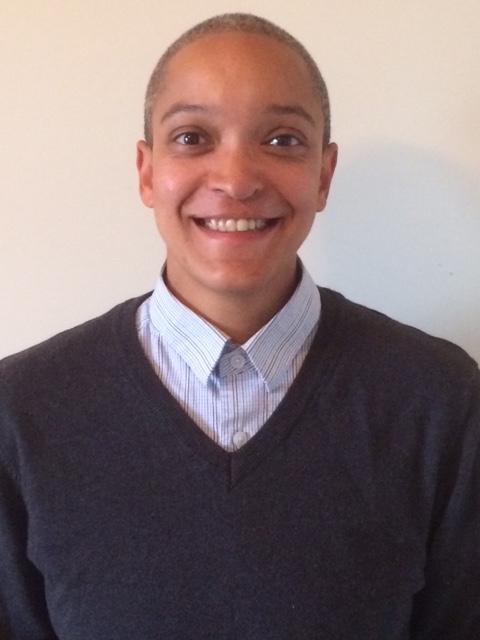
This week members of the WVCBP team joined other anti-hunger advocates from across the county in Washington, DC. It was part of MAZON‘s first-ever Emerging Advocacy Convening. A focus of the week was to talk to West Virginia’s congressional delegation about ways to strengthen SNAP, one of the nation’s most effective anti-hunger programs.
MAZON’s Emerging Advocacy Fund empowers state-based organizations to advocate on behalf of hungry people in their communities.
Pictured left to right: Emma Bryan with Senator Joe Manchin’s office, Kristen O’Sullivan with West Virginia Healthy Kids and Families Coalition, Josh Lohnes with the West Virginia University Food Lab, Phil Hancock with Senator Manchin’s office, Alexis Miller with MAZON, the WVCBP’s Kelly Allen and Seth DiStefano.
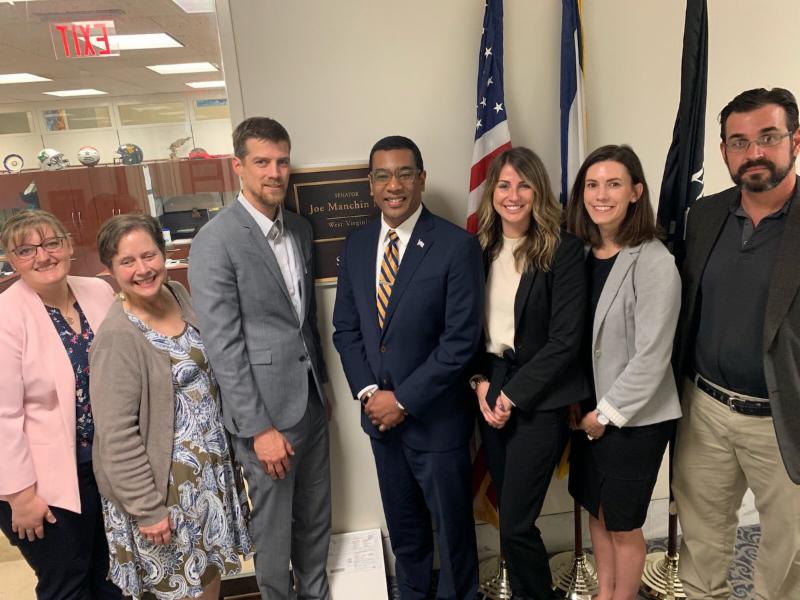
There are about 66,000 workers in West Virginia who earn less than the minimum wage. The majority of workers earning less than the minimum wage are women, 83 percent are over the age of 20, nearly half are either married or a parent, 83 percent have at least a high school diploma, two-thirds live in households earning less than $50,000 per year, more than half work full-time, and only 2,500 have a disability preventing work.
Eliminating the tipped wage, which hasn’t been increased since 1991, would be one of the easiest ways to address this problem that is exacerbating income inequality in West Virginia.
Read more in Sean’s blog post.

Angie Rosser is the Executive Director of the West Virginia Rivers Coalition, a statewide non-profit organization dedicated to the conservation and restoration of West Virginia’s exceptional rivers and streams. Angie has worked in West Virginia in the non-profit sector since 1995, developing a background in statewide policy, community organizing, coalition building and program administration. Her policy advisory roles include appointment to the State Conservation Committee, WV Public Water System Supply Study Commission, and WVDEP Environmental Protection Advisory Council. She lives along the banks of the Elk River in Clay County. Her motivation for clean water advocacy is rooted in the belief that the conservation of our water resources is central to a shared prosperity. Angie holds a BA in Anthropology from the University of North Carolina at Chapel Hill and an MA in Organizational Communication from West Virginia University.
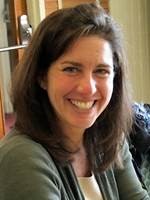
Help make sure West Virginia residents are counted in the 2020 census! These part-time jobs pay $13.50 to $15/hour plus mileage (58/cents/mile).

The U.S. is an increasingly unequal society: the average CEO makes nearly 800 times more than the average worker, and the wealthiest 1% of households own 40% of the wealth. It is impossible to have a functioning democracy when so few people control so much wealth.
Join us on May 19 from 2:00 – 4:00 pm at Temple Israel (2312 Kanawha Blvd E, Charleston) for a free workshop with Les Leopold, director of the Labor Institute and author of “Runaway Inequality,” to explore what inequality has to do with our current political situation and how people across the political spectrum can find common cause to fight for a fair economy. Register here.
Les will also lead a “Runaway Inequality” book talk on Monday, May 20, 6pm at Taylor Books (226 Capitol St, Charleston) to lead a discussion on:
What has made our economy less fair and left most of us less secure?
How does the US really compare with other developed countries?
What does economic inequality have to do with other critical issues, including education, criminal justice, racism, climate change, foreign trade and war?
What concrete steps can we take to begin building a fair and just society?
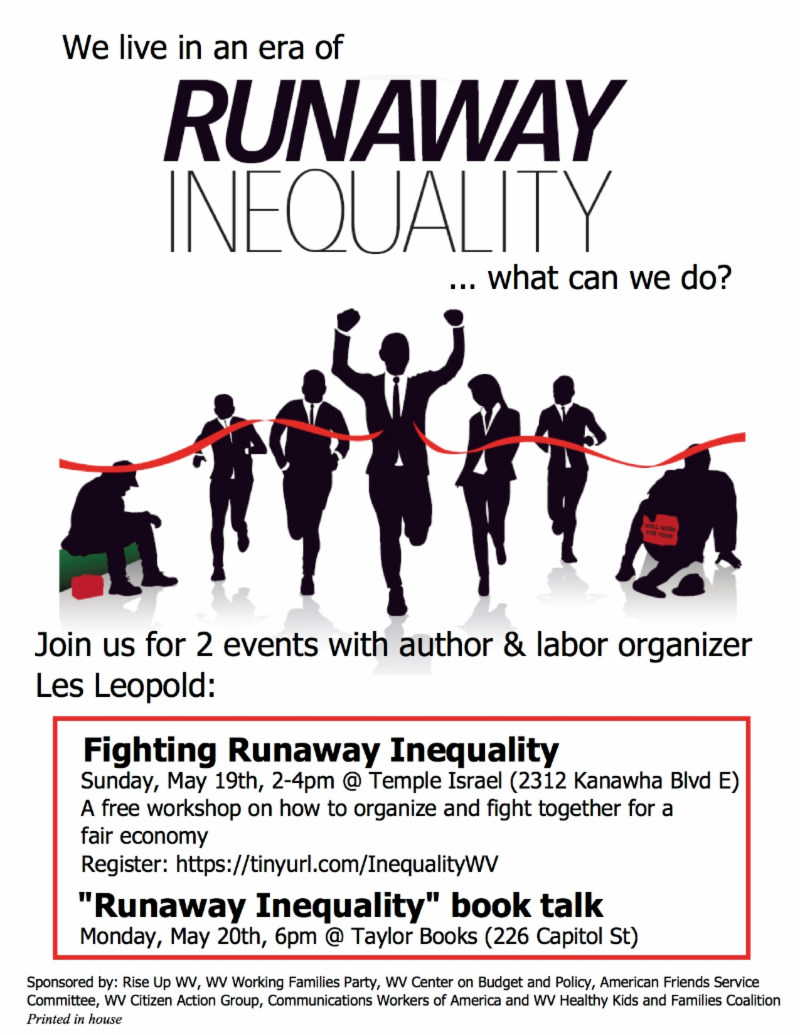
This year’s SPI will be held from July 26-28 at WV State University in Institute, WV and will center around criminal justice reforms. Panelists and speakers will highlight recent criminal justice reform victories as well as innovative policies that would help even more folks across the state avoid the criminal justice system when possible and improve the reentry process for those coming out of the justice system. Interactive sessions, including a re-entry simulation with officials from the U.S Department of Justice, will set the tone for the weekend.
